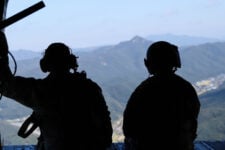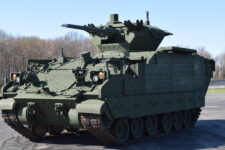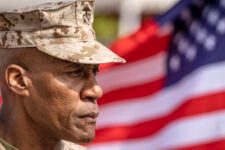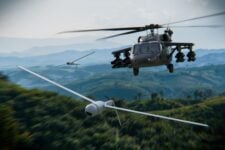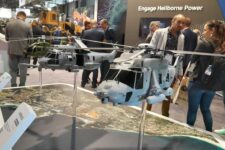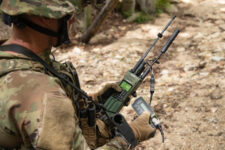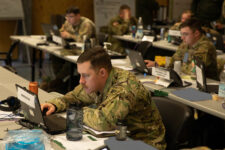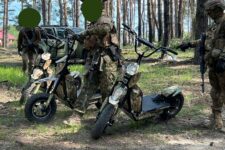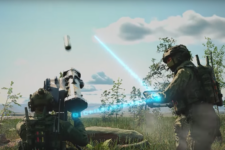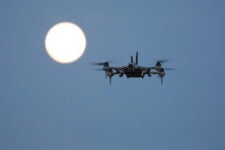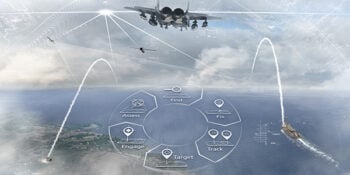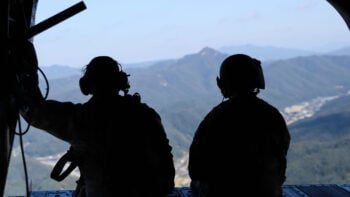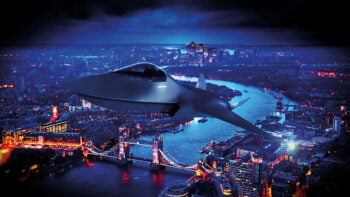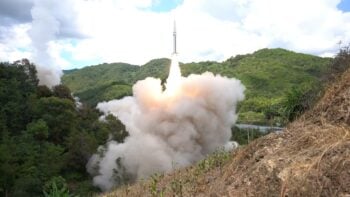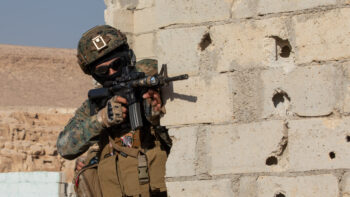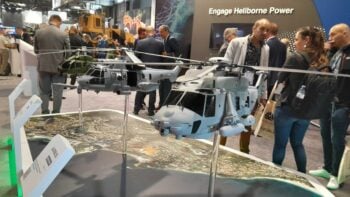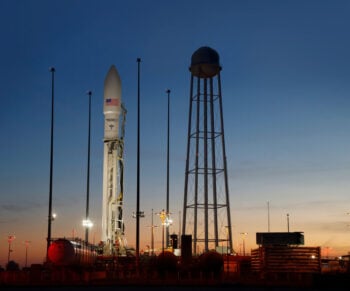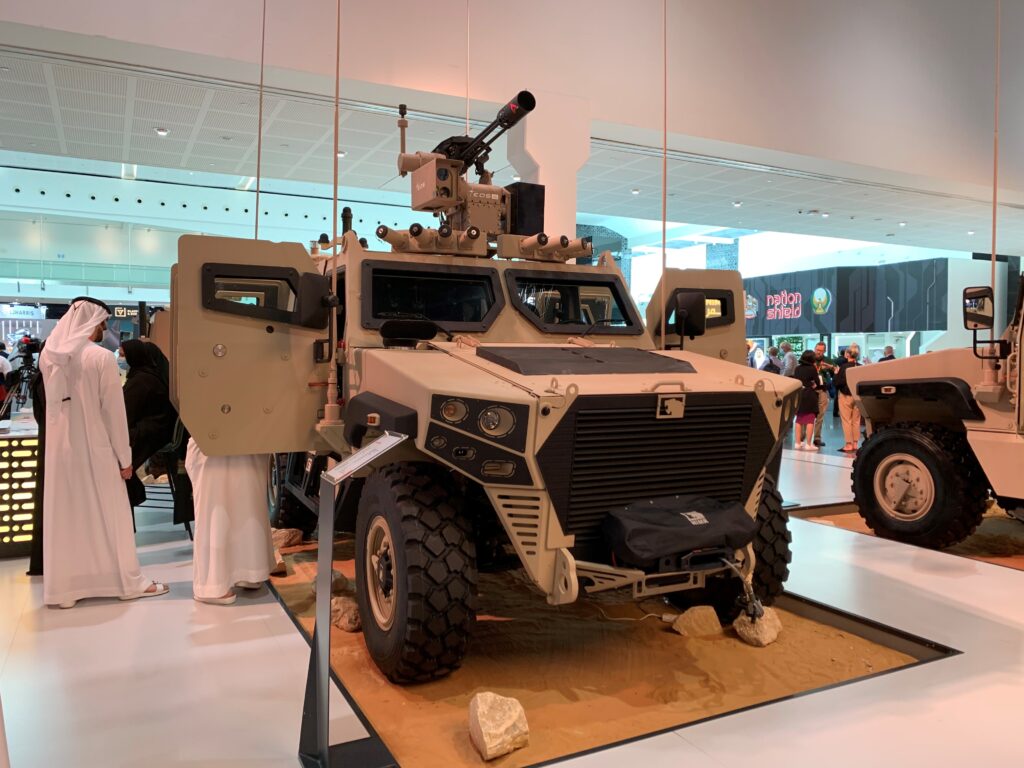
A AJBAN MK2 4×4 ballistic and blast protected light tactical patrol vehicle at IDEX 2021 defense show in Abu Dhabi (Chyrine Mezher)
BEIRUT: US-based L3Harris Technologies and UAE firm Al Taif have signed a new agreement aimed at modernizing the Emirates’ ground forces, with executives from both sides holding the deal up as a sign that American commitment in the region remains strong.
The deal, inked Sept. 8, covers a $13 million integration services contract for the final phase of L3Harris’ systems integration project conducted on the vehicle fleet of the UAE Armed Forces. The agreement mandates Al Taif to deliver program management and engineering services for Phase 3 including fabrication, bracket design support and installation.
Al Taif acting CEO Saif Al Dahbashi told Breaking Defense that the overall cost of the project’s three phrases is $19 million. Work began in 2014 and is expected to be completed in mid-2022.
“This partnership is testament to the company’s continued leadership in the MRO industry and to the dependability and durability of our offerings,” Al Dahbashi said. “We are confident that this will lead to future opportunities and provide the company with new avenues of growth.”
The works will be performed on all types of military vehicles, from light to medium and heavy armored.
“Our knowledge and experience is not confined to any specific vehicle,” he said. “We are prepared to provide the most complex and premium-quality maintenance services across a comprehensive portfolio, delivered against rigorous timelines in order to maximize vehicle and other asset availability.”
The UAE operates a large fleet of indigenous vehicles, the including Ajban 440 armored vehicle, HAFEET 630A armored personal carrier, and the 4×4 JAIS MRAP.
Al Taif, a part of the UAE-owned EDGE Group conglomerate, is responsible for the maintenance, support and technical readiness of all of the UAE Armed Forces tracked and wheeled vehicles. L3Harris is the lead systems integrator for the Emirates Land Tactical Systems (ELTS) contract for the UAE land forces.
As the prime contractor, L3Harris assembled a global consortium of suppliers for this mission critical requirement while fully supporting the earlier land forces’ communications equipment investments.
“The trust in our advanced technologies and proven C4I integration capabilities has enabled us to deliver a fully integrated digital battlefield management system across a full spectrum of ground tactical vehicles and command and control centers,” Gary Rosholt, L3Harris Technologies’ vice president for Middle East operations, said in an interview.
“This key ELTS partnership with Al Taif has enhanced our broader relationship with EDGE Group given the diversity of our L3Harris all domain, integrated mission systems technologies and the group’s advanced technology requirements and strategic partnership opportunities,” he added.
But most importantly, the UAE ELTS program has enabled “our expansion of this proven technology solution to Bahrain for their Bahrain Defense Forces C4I program baseline and supports the seamless interoperability of those GCC coalition forces,” he explained, “a solid foundation for the joint force integration requirements of the future.”
What it means
The partnership highlights the ongoing Emirati plans to modernize its armored vehicles fleet to meet evolving military demands.
To meet these demands, “we are focusing on enhancing the vehicles situational awareness capabilities, increase their lethality, and maintain a constant tactical advantage,” Miles Chambers, director of business development for platforms and systems at EDGE, told Breaking Defense. “C4I are as vital as mobility, firepower and protection, and we are constantly upgrading that.”
But perhaps most importantly, the contract lines up with the UAE’s efforts to indigenize military technology. Brandon C. Patrick, a mid-East defense analyst, said the UAE will not only “benefit from the jobs and further diversification intrinsic to the move, but by the boost it promises to the self-sufficiency of the UAE’s military.”
This is a key issue for the UAE and other Gulf states moving forward because, “as the world energy landscape shifts, so too may the nature of strategic alliances between the monarchies and the western powers they rely upon for support and legitimacy,” he added.
The contract comes at a time when the military procurement of armored vehicles is increasing across the Middle East to address “the growth in asymmetric warfare and insurgency across the globe,” said Miles Chambers, Director of Business Development, Platforms & Systems at EDGE. “There is also the need to replace legacy and aging vehicle fleets that no longer offer the protection, mobility and power requirements of modern integrated systems.”
Patrick agrees. As Abu Dhabi continues to expand as a defense supplier, “we can expect those spending patterns to continue in all areas of military technology and particularly those in which UAE firms have a stake.”
Whether this results in immediate increases in buying patterns remains to be seen, “and there will likely be some growing pains as L3 and Al Taif learn to work together and iron out procedural and manufacturing processes,” he said. “But I think it’s safe to assume that the UAE will back the venture fully as a proof of concept, at least.”
There is also political messaging from the corporate team up: that the UAE and US will continue relying on each other as strategic partners, despite regional concern that Washington is moving away from the Gulf.
Given Russia’s continued efforts to expand its footprint in the region and the ever-growing regional profile of Iran, “it is important to remember that the UAE is a partner in the strategic competitions of the past, present and future,” Patrick explained.
“They’re an important regional ally in the War on Terror — it didn’t end when the US pulled out of Afghanistan on August 31st — and a regional bulwark against great power competitors.”
Industry seems to agree.
“We remain fully committed and excited for the next fifty years,” said Rosholt. “We continue to see the long-term United States strong bilateral relationships with the UAE again reinforced with our most advanced defense technology being offered in the on-going F-35A and MQ-9B FMS opportunities, both with significant L3Harris mission systems content.”
The industry is clearly betting that the US and UAE relationship will continue, Patrick concluded. “Changing energy landscapes may point to drastically different economic realities in the future for Gulf states, and these realities may reshape the strategic landscape further down the line, but western security interests will likely override those considerations on the other side of the balance sheet.”
Weapons coproduction with S. Korea makes ‘a lot of sense,’ US Army weapons buyer says
“We need co-r&d, coproduction, and co-sustainment and cooperation. We need to be able to cooperate in various sectors so all this manned and unmanned systems will replace our traditional systems,” said South Korea’s minister for Defense Acquisition Program Administration Seok Jong-gun.
